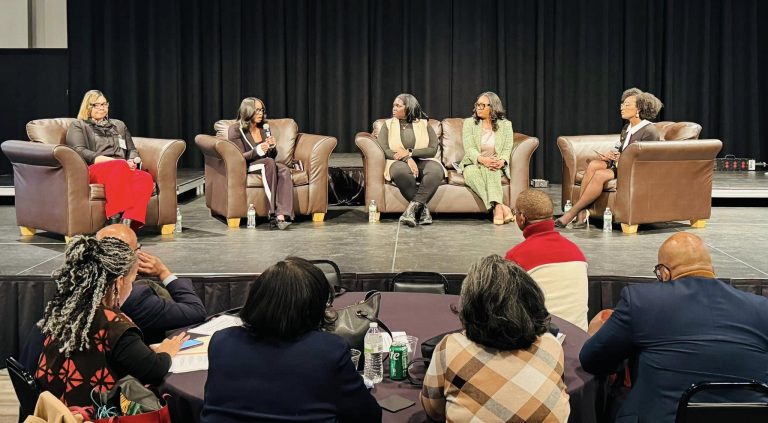A cross-section of business, political, educational, health, religious and environmental advocacy leaders gathered in Southwest Michigan during the opening week of Black History Month, for the Michigan Black Leadership Summit 2025. The gathering was part of ongoing efforts to empower Black communities throughout the state.
“Our theme this year, ‘The Black Dollar, Black Leadership and The Black Vote,’ reflects not just our goals for this event, but our promise to never stop pushing for progress,” said Trenton Bowens, founder and co-chair of the Michigan Black Summit.
“Over the past three years, we have built something extraordinary—a space where Black leadership, the Black vote, and the Black dollar are amplified and celebrated. And each year we’ve only gotten better,” he said in a written statement shared with The Final Call.
The two-day, non-partisan event, was held February 7–8, on the Benton Harbor campus of Lake Michigan College and featured several workshops on subjects including: mental health and advocacy, environmental justice, a “fireside chat” on women in leadership, another “fireside chat” on “The Power of the Black Dollar,” a workshop on “Michigan Economic Development,” and more.
—
“We come together to amplify the collective power of our community,” noted Tracy-Ann Jennings, co-chair of the Michigan Black Summit 2025. “I am profoundly inspired by the transformative potential that arises when we unite to advance our shared mission.
Each one of you represents an integral thread in the rich tapestry of progress we are weaving,” she said in part. “This summit is not just an event; it is a movement—a movement that challenges norms, embraces innovation, and lays the groundwork for tangible change.”
Nation of Islam Student Minister Troy Muhammad of Mosque No. 1 in Detroit also attended the summit. He told The Final Call that the “Faith and Governance” panel was well received by attendees and by those who asked questions about clergy’s role in today’s social and political discourse.
“I was on a panel with three pastors out of Michigan and one mayor,” Student Minister Troy Muhammad said. One of the panel goals was to serve as a reminder that the role of clergy is to represent Allah (God) and to serve the people in their communities.
“We are supposed to represent God, and God is above the president, God is above the governor, and God is above the mayors,” Student Minister Troy Muhammad insisted. “It is our duty as men of God and as women of God to bring that word of God to those in political leadership,” he said.
In a telephone interview with The Final Call, Benton Harbor Mayor Marcus Muhammad explained the summit aimed to convene Black leadership who work and serve in various areas of Black life.
“We wanted them to be represented at the summit to discuss and dialogue over its theme and how we can collectively work together in order to change the condition of Black life and Black people in the state of Michigan,” said Mayor Marcus Muhammad.

The summit included input from members of Black Mayors of Michigan (BMM), state and county officials, policymakers, and advocates from various political groups, he said.
The gathering also featured women leaders from public and private sectors, including participation from state representatives, state senators and Michigan’s Secretary of State Jocelyn Benson. Michigan’s Lieutenant Governor Garlin Gilchrist also participated.
“One of the points that the lieutenant governor raised was a statistic that I was unaware of which said that those who attempt to start a business, or become entrepreneurs, statistics say that most are Black and there is a propensity and an intensity from Black people all over America to ‘do for self,’” Mayor Muhammad explained. He also explained that one of the challenges is that “most businesses, 1-out-of-3, don’t survive.”
“These are challenges and ideas that all came up (at the summit), but it’s survival or death for the Black community and the biggest employer in the country is small business, so when entrepreneurship is low, unemployment is high,” he said.
The Most Honorable Elijah Muhammad taught his followers and Black people in general the importance of “doing for self,” working collectively to open Black-owned businesses, and to support these businesses.
“I thought that was a very interesting point, especially given that that’s one of the hallmarks of the Nation of Islam under the Teachings of the Most Honorable Elijah Muhammad, so it seems to have seeped into the populace of Black people here in America which is a great thing,” said Mayor Muhammad.





